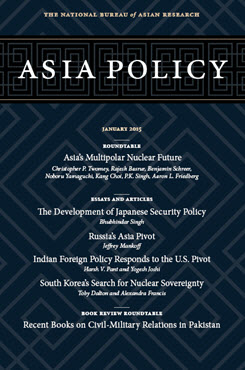The Utility of Nuclear and Conventional Forces in the Second Nuclear Age
A Japanese Military Perspective
This is one of seven essays in the roundtable “Approaching Critical Mass: Asia’s Multipolar Nuclear Future.”
Noboru Yamaguchi is Lieutenant General (Ret.) in the Japan Ground Self-Defense Force and Professor at the National Defense Academy of Japan.
This is one of seven essays in the roundtable Approaching Critical Mass: Asia’s Multipolar Nuclear Future.
In the recent debate on Japan’s security policy, the proliferation of WMD and their delivery means, such as missiles, has been one of the central issues. This issue is particularly critical to Japan, given North Korea’s acceleration of its nuclear weapons program alongside its long-range missile project. Japan’s new National Security Strategy (NSS) and National Defense Program Guidelines (NDPG) focus on both nuclear proliferation and the emerging nuclear threat posed by North Korea. At the same time, tension between Japan and China in the East China Sea has been increasing, while tensions between China and countries in the South China Sea have similarly been on the rise.
This essay will present a Japanese perspective on the nuclear dimension of regional security by, first, explaining Japan’s nuclear-related policies; second, discussing the roles of nuclear forces in Japan’s security policy; and, third, exploring Japan’s security strategy for managing a possible stability-instability paradox in the region, with particular emphasis on the East China Sea.
Japan’s Non-Nuclear Policy and Nuclear Forces
One of the most important aspects of Japan’s security policy since World War II is its non-nuclear policy based on the “three non-nuclear principles,” referring to the principles of not possessing nuclear weapons, not producing them, and not permitting their entry into Japan. [1] Not only does Japan adhere to these three principles as fundamental elements of its national policy, but Japan’s Atomic Energy Basic Law also prohibits the country from manufacturing or possessing nuclear weapons. Furthermore, Japan ratified the Treaty on the Non-Proliferation of Nuclear Weapons (NPT) in June 1976 and put itself under strict obligation not to produce or acquire nuclear weapons as a non-nuclear weapons state.
Endnotes
[1]This policy is explained in Japan’s annual defense white paper. See Ministry of Defense (Japan), Defense of Japan 2013 (Tokyo, 2013), http://www.mod.go.jp/e/publ/w_paper.
About Asia Policy
Asia Policy is a peer-reviewed scholarly journal presenting policy-relevant academic research on the Asia-Pacific that draws clear and concise conclusions useful to today’s policymakers. Asia Policy is published quarterly in January, April, July, and October and accepts submissions on a rolling basis. Learn more


